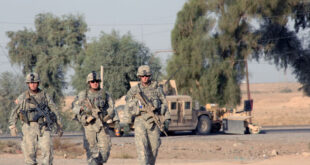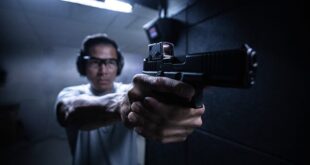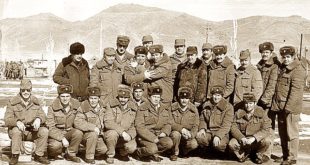This week, trials of SAS most decorated officer, Ben Roberts-Smith have continued.
A former unnamed SAS soldier denies making up evidence that Ben Roberts-Smith expressed a desire to just “kill” or seeing photographs of dead insurgents on his iPod. The Soldiers were on their third tour in Afghanistan.
The ex-special forces soldier codenamed Person Two returned to the Federal Court witness box on 24 Feb. AAP reported.
Person 14 accused Roberts-Smith of “used the prosthetic leg of a dead Afghan man as a drinking vessel to help him “decompress” and “bond” with fellow soldiers, AU News reported.
Mr Roberts-Smith expressed an alleged bloodlust while the pair were posted together in a “big bunker area” on picket duty.
“I just want to kill c****, I don’t give a f***, I just want to kill c****,” he allegedly said.
Media civil defamation trial reports have turned many Australians against Roberts-Smith, while others support him.
Roberts-Smith defense denies the salacious charges, said that Person Two was lying, a charge he denies. For the background of charges, see the Background below the Inquiry.
19 November 2020 The Inquiry:
Today, the Australian Defence Force is rightly held to account for allegations of grave misconduct by some members of our Special Forces community on operations in Afghanistan.
Before turning to the Inspector-General’s report, it’s important to note that over the period from 2005 to 2016, more than 26,000 Australians served in Afghanistan, 3,000 of them in the Special Operations Task Group.
An enormous amount of good work was done by many and we should be proud of their contribution, as they should be proud of their contribution.
What the Inspector-General finds is greatly at odds with that good effort and damaging to our moral authority as a military force.
His report details credible information regarding deeply disturbing allegations of unlawful killings by some.
I respectfully ask Australians to remember and have faith in the many. I assure you I do.
To the people of Afghanistan, on behalf of the Australian Defence Force, I sincerely and unreservedly apologise for any wrongdoing by Australian soldiers. I’ve spoken directly with my Afghan counterpart, General Zia, to convey this message.
Such alleged behaviour:
- profoundly disrespected the trust placed in us by the Afghan people who had asked us to their country to help them;
- it would have devastated the lives of Afghan families and communities, causing immeasurable pain and suffering; and
- it would have put in jeopardy our mission and the safety of our Afghan and coalition partners.
And to the people of Australia, I am sincerely sorry for any wrongdoing by members of the Australian Defence Force.
You’re right to expect that your defence force will defend your nation and its interests in a manner that accords with our nation’s values and laws.
Turning to the Inspector-General’s report, he found:
- none of the alleged unlawful killings were described as being in the heat of battle;
- none were alleged to have occurred in circumstances in which the intent of the perpetrator was unclear, confused or mistaken;
- and every person spoken to by the Inquiry thoroughly understood the Law of Armed Conflict and the Rules of Engagement under which they operated.
These findings allege the most serious breaches of military conduct and professional values.
The unlawful killing of civilians and prisoners is never acceptable.
It’s my duty and that of my fellow Chiefs to set things right.
Accountability rests with those who allegedly broke the law and with the chain-of-command responsible for the systemic failures, which enabled alleged breaches to occur and go undetected.
In order to deal with what happened we need to understand how it could have happened. I will offer a preliminary view based on both the Inspector-General’s findings and my own professional judgement.
It starts with culture.
The report finds that some Special Air Service Regiment commanders in Australia fostered within the SAS what Justice Brereton terms a self-centred warrior culture, a misplaced focus on prestige, status and power, turning away from the Regiment’s heritage of military excellence fused with the quiet humility of service.
The report notes that distorted culture was embraced and amplified by some experienced, charismatic and influential non-commissioned officers and their protégés who sought to fuse military excellence with ego, elitism and entitlement.
As units became consumed with preparing for and fighting the war much of the good order and discipline of military life fell away. Cutting corners, ignoring and bending rules was normalised.
What also emerged was a toxic competitiveness between the Special Air Service Regiment and the 2nd Commando Regiment. Destructive of trust, cohesion and mission and a disgrace to both.
Not correcting this culture as it developed was a failure of unit and higher command.
Turning now to the challenging counterinsurgency environment of Afghanistan.
People detained would be released if there was no formal link that linked them to insurgent activity.
‘Catch and release’, as it came to be known, throughout the coalition, was frustrating and carried with it some risk, but it was also understood to be a necessary measure, a point of balance between the needs of security and the needs of justice, both essential in a counterinsurgency campaign.
In this context it’s alleged that some patrols took the law into their own hands. Rules were broken, stories concocted, lies told and prisoners killed. And once that rule was broken, so too for some was any further restraint.
Those who wished to speak up were allegedly discouraged, intimidated and discredited.
Here I want to emphasise again that the overwhelming majority of Special Forces personnel did not choose to take this unlawful path. No matter the stress and the strain of battle, they remained true to our values and our laws.
They are truly special – special because of the self-discipline and the courage they constantly displayed. They upheld our culture of service over self.
Culture also affected reporting.
The Inspector-General finds that troop, squadron and commanding officers of some Special Operations Task Group rotations indirectly contributed to alleged criminal behaviour.
This occurred in a number of ways, but particularly by accepting deviations from professional standards, by sanitising or embellishing reporting to avoid attracting attention, and by not challenging or verifying accounts given by those on the ground.
Oversight mechanisms, such as legal reviews, operational assessments and inquiries took place, but they were not sufficiently rigorous or independent. Individuals and processes were either suborned into the culture that had emerged, obstructed by it or frustrated by the silence it bred.
This Inquiry found no evidence that there was knowledge of or reckless indifference to the commission of war crimes on the part of Troop, Squadron and Commanders of Special Operations Task Groups and higher command.
However, being unaware of or even deliberately kept unaware of unlawful actions does not relieve commanders of moral responsibility, and the report finds task group commanders bear responsibility for what happened under their command.
Higher arrangements for command and control were found to be too dispersed and too distanced to consistently give effective direction and control to Special Operations Task Groups.
While commanders at many levels described the status of Special Operations Command as stretched but manageable, none appreciated that reporting and governance systems, which routinely described extraordinary performance, were no longer reflecting the whole truth on the ground.
Reporting was positive and soldiers and field commanders alike showed genuine enthusiasm for their campaign and for their participation in it. Nevertheless, higher command should have recognised sooner that the units of Special Operations Command were unable to sustain all the demands placed upon them.
Justice Brereton considered in detail 57 allegations of incidents and issues.
He found there to be credible information to substantiate 23 incidents of alleged unlawful killing of 39 people by 25 Australian Special Forces personnel, predominantly from the Special Air Service Regiment.
Those alleged to have been unlawfully killed were all people under control – in lay terms, prisoners, farmers or other civilians.
This shameful record includes alleged instances in which new patrol members were coerced to shoot a prisoner in order to achieve that soldier’s first kill in an appalling practice known as ‘blooding’.
Further to this, ‘throwdown’ weapons and radios were also reportedly planted to support claims that people killed were ‘enemy killed in action’.
Some of these incidents took place in 2009 and 2010 with the majority occurring in the latter years of 2012 and 2013.
Alleged perpetrators deployed on between one and five Special Operations Task Group rotations over the period 2006 to 2013.
I have accepted all of the Inspector-General’s findings and a comprehensive implementation plan is being developed to action his 143 recommendations and any additional measures necessary.
The Chief of the Defence Force, General David Hurley has extended his gratitude and best wishes to Corporal Ben Roberts-Smith, VC, MG on his departure from full-time service in the Australian Defence Force.
“As Australia’s most decorated modern soldier, Corporal Roberts-Smith has become one of the most recognisable figures in Australia today. He was thrust into the spotlight when he was awarded the Victoria Cross for Australia in 2011 and has matured into a first class ambassador for our nation and the Australian Defence Force.
BACKGROUND Australian Afghan War Veteran Denies Allegations of War Crimes VOA Phil Mercer
Australia’s most decorated Afghanistan veteran will deny alleged war crimes at the start of his high-stakes defamation trial against one of the country’s biggest media companies. Ben Roberts-Smith will seek to prove he was unfairly portrayed in newspaper stories as having broken the moral and legal rules of war. He is seeking damages in Australia’s Federal Court from Nine Entertainment Co. and three journalists.
Newspaper reports in 2018 alleged Ben Roberts-Smith murdered a man in Afghanistan and encouraged his colleagues to drink beer from his victim’s prosthetic leg. He was also accused of killing an unarmed Afghan shepherd by kicking him off a cliff and ordering his fellow soldiers to shoot him.
The former Special Air Service Regiment (SAS) trooper, who received the Victoria Cross, Australia’s highest military honor, in 2011, has denied any wrongdoing. He said articles published by The Age, The Sydney Morning Herald and The Canberra Times newspapers portrayed him as a war criminal who disgraced his country by murdering Afghan civilians. Roberts-Smith said the stories were “baseless” and “flawed.”
His lawyer told the hearing Monday that he was “an exceptional soldier” but was the victim of “dishonest journalism” and “corrosive jealousy and lies.”
The trial in Sydney is expected to hear from about 60 witnesses over the next ten weeks.
Current and former members of Australia’s special forces are scheduled to give evidence anonymously. Other witnesses will testify via a video link from a law firm in Kabul.
Associate professor Ben Wadham, a military historian from Flinders University, told the Australian Broadcasting Corp., the case goes to heart of Australia’s conduct during times of conflict.
“It has brought into tension that question about: does everything and anything go in war, or do we actually have some responsibility to these higher values, and shouldn’t we be upholding them?” Wadham said.
Last November, a landmark inquiry into Australian special forces in Afghanistan found “credible evidence” of the “murder” of 39 prisoners, farmers, or other civilians.
A lengthy investigation examined claims of unlawful killings and other possible breaches by Australia’s elite special forces in Afghanistan between 2005 and 2016.
Ben Roberts-Smith left the army in 2013 and is currently the general manager of the Seven Network, a media company, in Brisbane and regional Queensland.
 Soldier of Fortune Magazine The Journal of Professional Adventurers
Soldier of Fortune Magazine The Journal of Professional Adventurers





